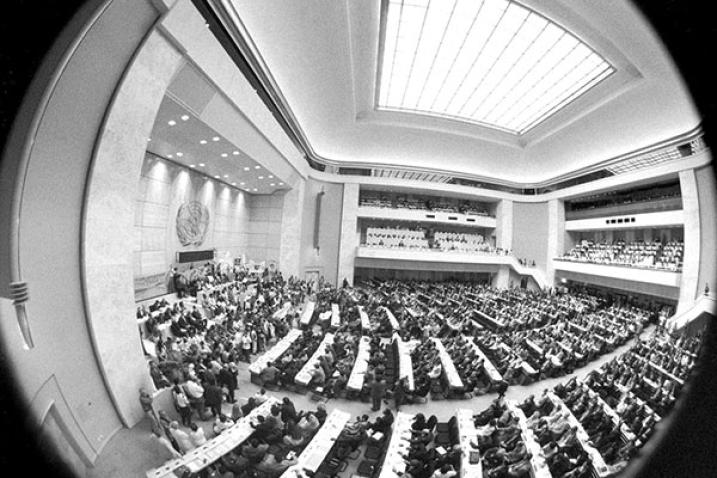On 19 December 2019, the UN General Assembly adopted resolution 74/245, which designated 4 December as the International Day of Banks in recognition of the significant potential of multilateral development banks and other international development banks in financing sustainable development and providing know-how; and also in recognition of the vital role of the banking systems in Member States in contributing to the improvement of the standard of living.
In September 2015, the General Assembly adopted the comprehensive, far-reaching and people-centred set of universal and transformative Sustainable Development Goals and targets, and reaffirmed its commitment to working tirelessly for the full implementation of those goals by 2030. It recognized that eradicating poverty in all its forms and dimensions, including extreme poverty, is the greatest global challenge and an indispensable requirement for sustainable development. The goals seek to achieve sustainable development in its three dimensions – economic, social and environmental – in a balanced and integrated manner, building on the achievements of the Millennium Development Goals and addressing their unfinished business.
Achieving sustainable development — in particular eradicating poverty, reducing inequality and combating climate change — requires a long-term perspective, with Governments, the private sector and civil society working together to tackle global challenges. However, a more uncertain world favours more short-term behaviour. Therefore, private businesses, many of whom already face a range of short-term incentives, hesitate to commit funds to long-term investment projects. During periods of financial insecurity, households often focus on their immediate needs. And policymakers are often guided by short-term political cycles.
Hence, effort is needed at all levels to ensure that strengthened collective action can help reduce global uncertainty, while financial innovation can generate significant progress across the 2030 Agenda and the Addis Ababa Action Agenda.
‘‘Globalization and technological change have contributed to reducing extreme poverty at the global level, but uneven distribution of the benefits has left many behind and has undermined support for the global architecture.’’
—Note by the Secretary-General (E/FFDF/2019/2)
The global economy is facing heightened risks and financial volatility, with global growth likely to have peaked. Geopolitical factors, trade disputes, financial market volatility and non-economic factors, such as climate change risk further impeding growth, stability and development and worsening poverty, inequality and vulnerabilities. It is becoming increasingly urgent to address the systemic economic and financial risks and architectural gaps that threaten the implementation of the 2030 Agenda.
Weaknesses in the global financial system could pose heightened risks to the achievement of the Sustainable Development Goals. Those risks include the volatility of international capital flows, resulting from the short-term nature of many elements of international capital markets; persistent global imbalances; debt sustainability challenges in the public and private sector; and growing monopoly power and less effective competition policies. High debt levels in public and private entities, including through highly-leveraged financial market derivatives, raise vulnerabilities and feed boom-bust cycles. The compression of the wage share of income has exacerbated inequality. The rapid pace of technological change, while possibly providing new remedies, can also exacerbate global systemic risks.
In the Addis Ababa Action Agenda, it was noted that cohesive nationally owned sustainable development strategies, supported by integrated national financing frameworks, would be at the heart of efforts. In response to the 2030 Agenda, many countries have injected new life into their sustainable development strategies. However, most strategies do not have concrete financing plans to fund their implementation. As noted in the Addis Ababa Action Agenda, the reflection process should be complemented by efforts to increase coherence within the global system and improve the inclusivity of global economic governance.
In the medium to longer-term, shifts in the international monetary system, including those related to external adjustment and global imbalances, could increase financial volatility, in particular in a period of political uncertainty. That fact underscores the importance of strengthened international cooperation and of ensuring adequate resources and comprehensive coverage in the global financial safety net. Under the current financial architecture, currency risk associated with welcome international financing is often borne by actors in developing countries that are least able to manage it.
Given the complex and ambitious set of transformations needed to deliver on the 2030 Agenda, coherence across policy areas is critical. There is a growing understanding of how financial regulations are affecting incentives for sustainable development investment. There is less understanding of the impacts of social and environmental risks on credit quality and the stability of the financial system. Policies and regulations need to act together in order to create a sustainable financial system. The regulatory system needs to be congruent with the measures used to boost the sustainability of the private financial system, such as sustainability reporting and impact measurement.
Well-run national development banks can help countries develop financing options for Sustainable Development Goal-related investments. Such banks should be aligned with the Goals in a holistic way and be considered in integrated national financing frameworks. Collaboration between national development banks and multilateral banks, through co-financing or on-lending arrangements, can enhance Goal-related finance through the complementarity of international resources and local market knowledge.
While achieving the 2030 Agenda demands the maximization of synergies and the breaking down of silos, ensuring that financial and economic systems are coherent with sustainable development is critical, well-functioning national and regional development banks can play in financing sustainable development, particularly in credit market segments in which commercial banks are not fully engaged and where large financing gaps exist, based on sound lending frameworks and compliance with appropriate social and environmental safeguards. This includes areas such as sustainable infrastructure, energy, agriculture, industrialization, science, technology, and innovation, as well as financial inclusion and financing of micro, small and medium-sized enterprises. National and regional development banks also play a valuable countercyclical role, especially during financial crises when private sector entities become highly risk-averse. We call upon national and regional development banks to expand their contributions in these areas, and further urge relevant international public and private actors to support such banks in developing countries.
Nonetheless, it should be noted that financing policies do not work in isolation. Integrated financing frameworks should not only respond to financing challenges, but also to the realities of a changing global landscape. For example, to combat inequality, including gender inequalities, national policies will need to address the falling wage share, growing vulnerabilities, digitization and increasing market concentration, among other issues. Governments should revisit their labour market policies, social protection systems, fiscal policies, competition policies, trade policies and financial sector regulations and strategies to ensure that they are in line with the new realities.
This article has been published in the United Nations' site through this link: International Day of Banks | United Nations (https://www.un.org/en/observances/international-day-of-banks#:~:text=On%2019%20December%202019%2C%20the,and%20providing%20know%2Dhow%3B%20and)




